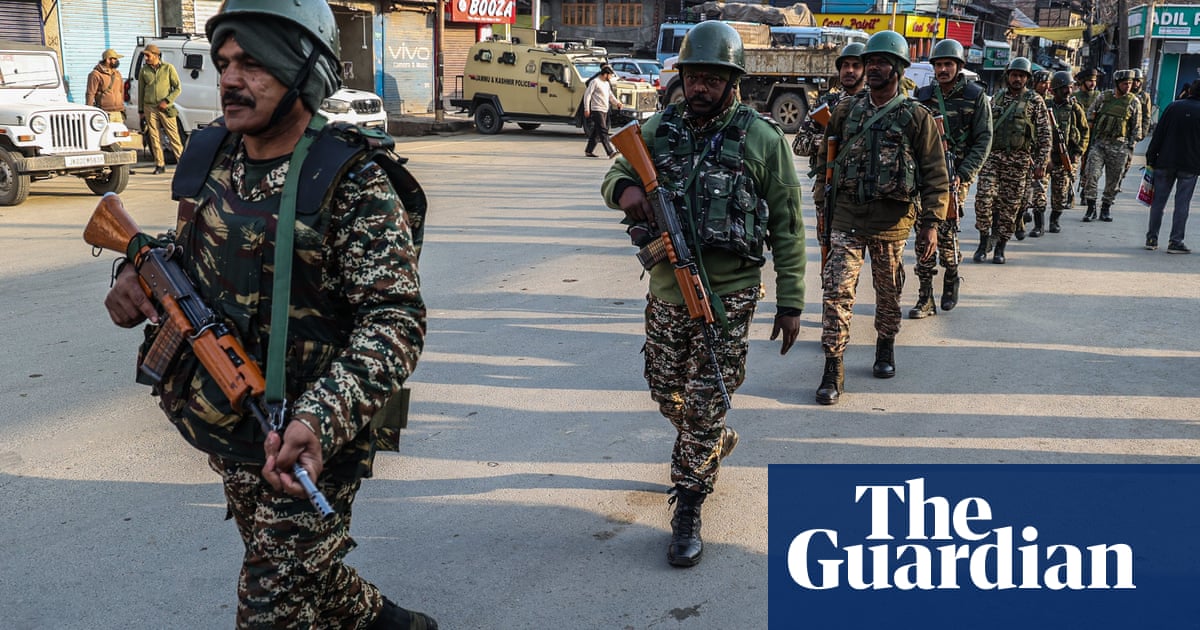India’s army chief was set to lead a high-level security review in Srinagar on Friday, days after militants opened fire on tourists in Indian-held Kashmir, killing 26 civilians in one of theworst such attacks in years.
The brazen assault, carried out in a mountain meadow near Pahalgam, has derailed prime minister Narendra Modi’s claims of restored calm in the restive Himalayan territory and sent tensions soaring between nuclear-armed India andPakistan.
The Indian Army has launched sweeping “search-and-destroy” operations, deployed surveillance drones, and ramped up troop numbers across theKashmirValley. A manhunt is underway for three suspects – one Indian national and two Pakistanis.
Early on Friday, authorities in Indian Kashmir demolished the houses of two suspected militants, one of whom is an accused in Tuesday’s attack, an official said.
As tensions rise between the two countries, the United Nations has urged India and Pakistan to show “maximum restraint”. The two countries have imposedtit-for-tat diplomatic measuresover a deadly shooting in Kashmir.
Relations haveplunged to their lowest level in years, with India accusing Pakistan of supporting “cross-border terrorism”, after gunmen carried out the worst attack on civilians in contested Muslim-majority Kashmir in a quarter of a century.
“We very much appeal to both the governments … to exercise maximum restraint, and to ensure that the situation and the developments we’ve seen do not deteriorate any further,” UN spokesperson Stephane Dujarric told reporters in New York on Thursday.
“Any issues between Pakistan and India, we believe, can be and should be resolved peacefully through meaningful mutual engagement.”
General Upendra Dwivedi’s visit to the regional capital underscores a sharp increase in military and diplomatic activity. India on Thursday began large-scale air and naval drills, which analysts say could pave the way for military action. The Indian Air Force’s Gaganshakti exercises, showcasing its Rafale jets and elite strike squadrons, have assumed added urgency, while the navy has intensified manoeuvres and test-fired a surface-to-air missile.
“There are many imponderables Modi must deal with, including the significant capabilities of the Pakistan Army,” veteran analyst C. Raja Mohan wrote in The Indian Express. “But given the horrific nature of the attack and the outrage that has convulsed the nation - the victims came from 15 states across India - the PM may have no option but to explore some major risks.”
On the diplomatic front, foreign secretary Vikram Misri briefed envoys from some 25 countries, including key G20 partners, Gulf states, and notably, China. Beijing’s inclusion, despite strained ties, was seen as a bid to build broader global consensus.
India presented what it called “clear evidence of cross-border complicity.” An obscure group calling itself The Resistance Front has claimed responsibility for the attack. Indian officials say it’s a proxy for Pakistan-based Lashkar-e-Taiba or a similar outfit. Islamabad denied involvement, accusing India of failing to provide proof.
Modi vowed on Thursday to hunt down the gunmen responsible forkilling 26 civilians, after Indian police identified two of the three fugitive gunmen as Pakistani.
“I say to the whole world: India will identify, track and punish every terrorist and their backer,” Modi said, in his first speech since Tuesday’s attack in the Himalayan region. “We will pursue them to the ends of the Earth.”
Denying any involvement, Islamabad called attempts to link Pakistan to the Pahalgam attack “frivolous” and vowed to respond to any Indian action.
“Any threat to Pakistan’s sovereignty and to the security of its people will be met with firm reciprocal measures in all domains,” a Pakistani statement said, after the Pakistani prime minister, Shehbaz Sharif, held a rare national security committee meeting with top military chiefs.
Kashmir has been divided between India and Pakistan since its independence in 1947, with both claiming the territory in full but governing separate portions of it.
Rebel groups have waged an insurgency in Indian-controlled Kashmir since 1989, demanding independence or a merger with Pakistan.
Indian police say the three gunmen are members of the Pakistan-based Lashkar-e-Taiba group, a UN-designated terrorist organisation. They offered a bounty of 2m rupees ($23,500) for information leading to each man’s arrest.
A day after the attack, New Delhi suspended a water-sharing treaty, announced the closure of the main land border crossing with Pakistan, downgraded diplomatic ties, and withdrew visas for Pakistanis.
In response, Islamabad on Thursday ordered the expulsion of Indian diplomats and military advisers, cancelling visas for Indian nationals – with the exception of Sikh pilgrims – and closing the main border crossing from its side.
Pakistan also warned any attempt by India to stop the supply of water from the Indus River would be an “act of war”.
